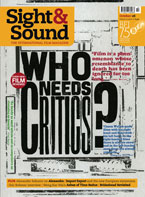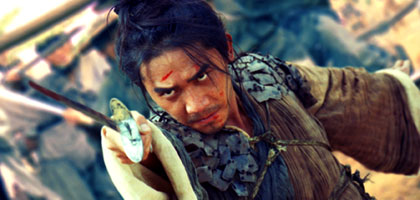
Out of the ashes
Ashes of Time Redux

The definitive new version of Wong Kar-Wai's complex and visually stunning martial-arts epic in which east meets Western sees the film at last fulfilling its sizeable creative and commercial potential, says Mark Sinker
In all its reincarnations between 1994 and today, Wong Kar-Wai's martial-arts genre-project Ashes of Time, a tale of soured love and swordsmen, has always been a film about change, and the trials and hold of memory, so it's fitting that its own history eludes easy grasp. The print I saw at London's ICA in the late 1990s seemed in poor condition and was edited in a deliberately confusing fashion. Whereas Chungking Express, made the same year, was a hip, lurching glide through present-day big-city anomie, Ashes was compelling largely because on first viewing it seemed so indifferent to making sense or even relying on chic allure. It was baffling to those unfamiliar with the source material.
Hugely costly at the time and two years in the making, Ashes has been recut, says Wong Kar-Wai, for a number of reasons: several versions were in circulation, not all of them approved; the original negatives were poorly stored and needed rescuing; and only now are the technical means available to make the film he wanted. It may be that Wong's unspoken reason is that the structure of his first and more demanding edit was a tactical error if he was intending to capitalise on the unexpected cachet and momentum of the martial-arts film: if, that is, he wanted Ashes to reside in the same art-cult neighbourhood of House of Flying Daggers (2004) or Zu Warriors from the Magic Mountain (1983). Hence its new, more viewer-friendly and gorgeous form.
The film is based on the million-selling, multi-part novel The Eagle-Shooting Heroes, a classic of the wuxia (martial arts and chivalry) genre written by Louis Cha, the Hong Kong politician, newspaper magnate and renowned scholar of Buddhism who wrote as Jin Yong. Ashes focuses on the early lives of two of Yong's main characters, the malignant Lord of the East and the malicious Lord of the West. The latter, Ouyang, has secreted himself in the killer-for-hire trade and the film begins as the former, Huang, brings an unexpected gift of the 'wine of oblivion' to his friend. As a literary genre, wuxia is invisible in the west; as cinema, it's trapped somewhere between the exotic and the absurd, its stylised conventions often a barrier to a serious examination of its philosophies. One way into these is to contrast wuxia's passion for the man-on-man duel - the honour of the finest fighter when beset on all sides - against its apparent cousin, the Western. Wong has cited The Searchers as a model, with its near-subliminal backstory told in glances of a lost but never-forgotten love. In its spacious, spare, heat-saturated look, Ashes also invokes Sergio Leone's Dollars-trilogy, and Leslie Cheung's Ouyang, the main character and narrator, is not dissimilar in his taciturn isolation to Eastwood's 'the man with no name'.
Gunplay in the frontier dust (so very American) is largely about the moral complexity of the individual trying to elucidate and fight for right where law has not yet arrived. However, while the people in Ashes may be lonely, none is alone, and its story maps astrological archetypes in group activity by comparing and contrasting different characters. The film spans the changing seasons of a year, as marked by deadpan quotations from the Buddhist almanac, such as "Do not christen new boats." For all his self-possession, Ouyang seems to be passing through the stages of bereavement, from denial to acceptance, his hidden turmoil dramatised by each season's tale. These stories tell the unfolding narrative of his guest of the day - be it friend, client or hired killer.
Huang, a capricious and selfish heartbreaker, comes between Peach Blossom and her husband, a near-blind swordsman, casting them both into desperate misery and rage. The narcissistic Murong Yin/Yang, a giggly princess unable to decide if she's a boy or a girl, spends a night dreaming that Ouyang is Huang (whom she both loves and wants to kill), while Ouyang dreams she's someone else; Yin/Yang both loves and wants to kill herself and ends up duelling with her water reflection in an explosive and bizarre fantasy sequence. The near-blind swordsman forces a kiss from a peasant girl who wants her brother's death avenged, then frees himself from hurt by suicidally facing the brother's killers, a seemingly endless sea of bandits. Hong Qi, a swordsman in search of glory, wants to shake off his wife, who pads after him with sunhat and wicker backpack, but finds deeper satisfaction and a sense of honour helping the peasant girl in return for a single egg. Ouyang's bruised attempt to lose himself as a cynical mercenary is increasingly challenged. He gazes enviously after Hong Qi, who is now reconciled with his wife. Finally Ouyang intervenes in his own story as he informs Peach Blossom of her husband's death and at last grasps the truth about the woman he loved. All of these micro-tales act as prisms through which Ouyang begins to see the dynamics of his own story, which we learn about only in the fifth and final season, the return of spring.
All this could easily be exhaustingly overwrought - the women in particular act out a fair amount of mute, slow-motion agony. Two elements balance it out: the first is Cheung's sardonic performance as Ouyang; the second is Christopher Doyle's typically extraordinary camerawork, as the demands of capturing light in the desert push him outside his own, albeit extremely daring, comfort zone. The splash and glint of the fight scenes is mesmerising and the blurred-yet-detailed fluid-jerky style familiar in Doyle's city-based films is a heart-stopping representation of time slowed during violent action, the simultaneous precision and distance of life-and-death decisions made during battle. The colour of remembered (or dreamt) peach blossom, when it arrives, is hallucinatory in its sharpness. When Franky Chan's attempt to concoct a Morricone-style soundtrack is in danger of seeming pleadingly earnest, Doyle's camera supplies exactly the right amount of whipcrack estrangement. If Cheung seems impressively undemonstrative, despite the turbulence of his hidden emotions, the landscape is pitilessly indifferent. The backdrop of desert and eclipse may be pathetic fallacy, but their startling, confrontational beauty represents everything that Ouyang hides from: as he begins at last to face his feelings, he admits he has never really taken in the view.
Ashes of Time isn't about what happens onscreen, it's about human disconnection; how we choose, for the sake of honour, love or greed, to avoid the physical present. The film's style, its pacing and philosophy, place what hasn't happened, offscreen, at the centre of the viewer's awareness. This goes some way to explain the profusion of interrupted timelines in the original version, in which memory is a bewildering delirium of unintended schisms, of wounding breaks with reason and clarity. The simplifications of Redux diminish this argument-by-edit. Now that we know less about Ouyang's backstory, we may not twig how wrongheaded he is as a narrator or the extent to which his steady tone is an extended joke against himself. We may be left feeling that the visual aspects are more melodramatic surface trickery than emotional insight, but on the other hand the reduced demands on our memory (to make sense of the stories for ourselves) no longer distracts from much that remains extraordinary in this film.
